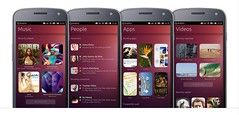By +Katherine Noyes
 |
| (Credit:www.guilli.com) |
It
seems fair to say that most Linux fans have already become accustomed
to Linux's dominance on supercomputers
and servers, as well as Linux-based
Android's ever-growing
success in the mobile realm.
What's
going to take some getting used to, however, is the fact that, even
beyond Android, Linux is increasingly dominating mobile
computing.
Yes,
there's iOS, which has enjoyed undeniable success; the same can
hardly be said, however, for Windows, while BlackBerry is in a state
of uncertain transition. Just about all the other winning or
up-and-coming platforms, however, are based on Linux.
Let's
take a look at some of the leading contenders.
1.
Ubuntu
|
|
| ubuntu smartphone os (Photo credit: sidduz) |
Back
in January, Canonical introduced Ubuntu for phones; this month, it
unveiled Ubuntu for tablets. There's no actual hardware out yet, of
course, but just last week the company released the developer's
preview image. Say what you will about Canonical's strategy or
commitment to freedom, but given all the coverage these announcements
have had in the mainstream media, there's no denying it's gotten the
world's attention.
2.
Firefox OS
3.
Tizen
Tizen
may be a less familiar name to some, but it's essentially taken
MeeGo's place under the Linux Foundation's proverbial wing. Backed
by both Intel and Samsung, Tizen recently released
version
2.0 of its source code and SDK. Samsung just announced that it's
folding Bada into Tizen at long last, and Tizen phones from the
company could reportedly surface as soon as this
summer.
4.
Sailfish OS
 |
| (Credit: SailfishOS.org) |
Also
based on MeeGo
as well
as Mer, meanwhile, is Sailfish OS, the creation of Finnish Jolla.
Just yesterday Jolla
released
an
alpha version of its eagerly anticipated SDK for 32- and 64-bit
Linux. “The
Sailfish OS is a mobile-optimized operating system that has the
flexibility, ubiquity and stability of the Linux core with a cutting
edge user experience built with the renowned Qt platform,” the
project website explains.
5.
webOS
|
|
| Palm webOS Launcher Screenshot (Photo credit: Wikipedia) |
Last
but not least, it's also worth noting that after
a long and arduous road with many bumps along the way, webOS is being
resurrected once more by
LG. While its initial focus is on Smart
TVs, who
knows what the future will
bring?
It's
long been a common mind-set
that mainstream acceptance of Linux is a far-off goal. Judging by
what's going on in the mobile world, however, I'd say that
in many ways, it's already
been achieved.
In other
words, world domination complete. ;)
-- Katherine Noyes
























My previous phone was HP's "Palm Pixi+", which I really liked a lot (though my wife decided she hated hers). The card metaphor of WebOS is pretty cool, better than Android's invisible tasks. And the WebOS app "store" was decent enough. I hope WebOS regathers some momentum.
ReplyDeleteI still miss the size of my Pixi, although the screen on the Razr Maxx is kinder to my aging eyeballs.
I miss my Nokia N95 (Symbian S60 OS). Bought in 2007 Spring, and it still has features which exceed most smartphones today. We all know what happened to Nokia. Sad.
ReplyDelete